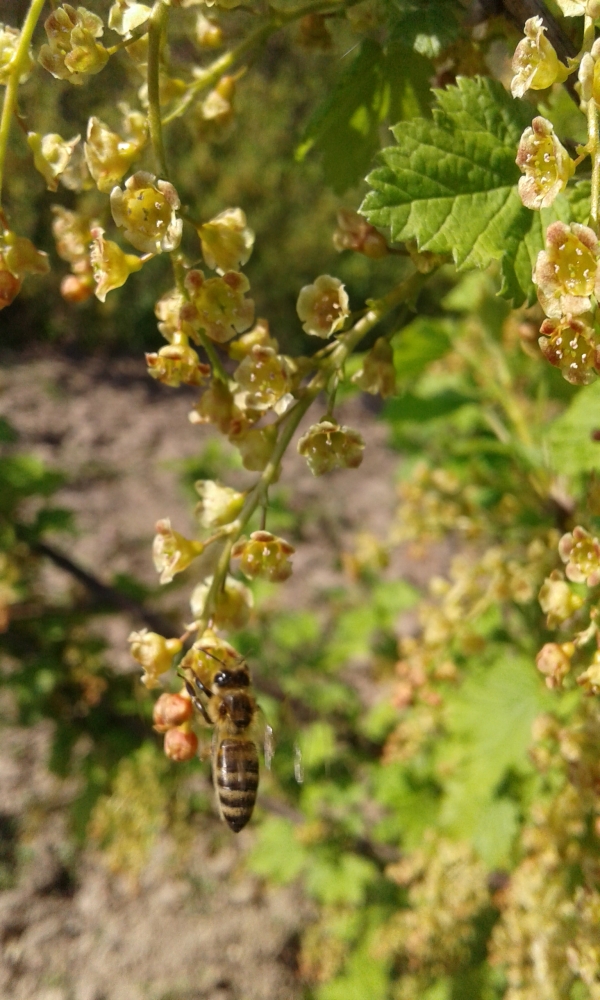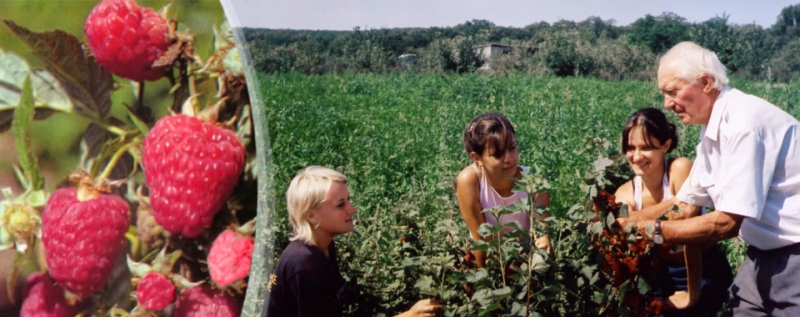День відкритих дверей: кращі випускники коледжів ознайомились з матеріально-технічною базою кафедри садівництва ім. проф. В.Л. Симиренка
Профорієнтаційна робота співробітників кафедри садівництва ім. проф. В.Л. Симиренка спрямована на відбір якісних абітурієнтів. З цією метою у квітні 2017 р. було організовано день відкритих дверей для кращих випускників коледжів. На захід завітало близько 50 студентів випускних курсів «Боярського коледжу екології і природних ресурсів», «Немішаївського агротехнічного коледжу» та «Заліщицького аграрного коледжу ім. Є.Храпливого», які на базі освітнього рівня «Молодшого спеціаліста» мають можливість вступити в університет на програму скороченого терміну навчання або на 3 курс.

Заступники декана агробіологічного факультету Микола Іванюк та Володимир Завгородній надали інформацію про перелік спеціальностей та перспективи навчання і подальшого працевлаштування. Відмітили, що випускники кафедри садівництва працевлаштовуються агрономами-технологами у садівничих, розсадницьких, тепличних господарствах, на виноградниках тощо. Також за своєю фаховою підготовкою вони можуть працювати у структурах, які займаються декоративним садівництвом, вирощуванням польових культур, імпортом і продажем обладнання та матеріалів для галузі садівництва. Навчання можна продовжити в аспірантурі, набір у яку проводиться щорічно.



Гості також мали можливість ознайомитися з матеріально-технічною та навчальною базою агробіологічного факультету та його кафедрами в 4 корпусі. Далі роботу продовжили на кафедрі садівництва у 7 навчальному корпусі. Спочатку завідувачка кафедри, професор Т.Є. Кондратенко познайомила гостей з перспективами спеціальності «Садівництво та виноградарство». Детально окреслила напрямки навчальної та науково-дослідної роботи кафедри та зазначила, що наші студенти мають можливість стажуватися у кращих профільних господарствах та наукових установах України. Випускники коледжів минулих років, які на даний момент є успішними студентами факультету розповіли своїм землякам як насичено пульсує студентське життя, про культурно-масові заходи, які відбуваються на факультеті та університеті та запросили приєднуватися до дружної родини агробіологічного факультету НУБіП України.

Далі гості у супроводі доцента кафедри садівництва Юрія Андрусика перемістилася на територію навчально-дослідного поля “Плодоовочевий сад”, яке розташоване в 10 хв. пішої прогулянки від навчальних корпусів, за адресою вул. Генерала Родімцева, 6 а.

Увагу майбутніх абітурієнтів привернули доглянуті ділянки, на яких проходять практичні заняття, а також навчальні і предметні практики з профільних дисциплін (розсадництво, плодівництво, виноградарство).


Тут на площі 5 га представлено навчальні об'єкти з дисциплін кафедри: інтенсивні насадженння плодових і ягідних культур, виноградник, розсадник, маточник клонових підщеп, багата помологічна колекція сортів та ін. Також на базі саду виконуються дипломні бакалаврські, магістерські та кандидатські роботи.

Цікаво слухачам було дізнатися про основні напрями науково-дослідної роботи кафедри: створення сортів плодових, ягідних та малопоширених культур, дослідження їх господарсько-біологічних особливостей та розробка технологій вирощування.


Позитивно спийняли вони інформацію про те, що залучення студентської молоді до науково-дослідної роботи починається з 2-го курсу шляхом закріплення їх за кафедрою для написання дипломних робіт. Результати своєї дослідної роботи студенти представляють на щорічній студентській науковій конференції.

Найактивніші молоді науковці беруть участь у виконанні наукової тематики кафедри та поглиблюють свої знання з садівництва у студентському науковому гуртку "Симиренківець".

Підтвердженням професійності викладачів кафедри та компетентності наших студентів стала інформація про те, що два роки поспіль магістри кафедри садівництва Олександра Крохіна (2016 р) та Олена Василенко у 2017 р. ставали переможцями Всеукраїнської студентської олімпіади зі спеціальності «Садівництво та виноградарство», яка проходила на базі Уманського національного університету садівництва.


Випускники коледжів були вражені почути, що співробітниками проблемної науково-дослідної лабораторії з питань селекції ягідних і плодових культур та технологій їх вирощування, яка функціонує на кафедрі було селекціоновано більше 80 сортів садових культур, з яких 19 внесено до Реєстру сортів України.


Зацікавленість студентів викликала метеостанція, яка знаходиться в НДП "Плодоовочевий сад". Даний програмно-апаратний комплекс Метеотректм працює автономно за допомогою сонячної батареї та забезпечує можливість цілодобового контролю за метеопоказниками: температура і вологість повітря, температура грунту, атмосферний тиск, кількість опадів, сила і напрям вітру, інтенсивність сонячного випромінювання. За допомогою каналів цифрофого звязку стандарту GPRS інформація передається на сервер і зберігається там. На основі отриманих данних співробітники саду можуть планувати поливи, прогнозувати розвиток збудників хвороб і шкідників та проводити необхідні захисні заходи.

Маємо сподівання, що наша зустріч не остання і отримана інформація значною мірою вплине на вибір майбутного місця навчання.
Юрій Андрусик,
доцент кафедри садівництва
Normal
0
false
false
false
MicrosoftInternetExplorer4
Normal
0
false
false
false
MicrosoftInternetExplorer4
Normal 0 false false false MicrosoftInternetExplorer4
